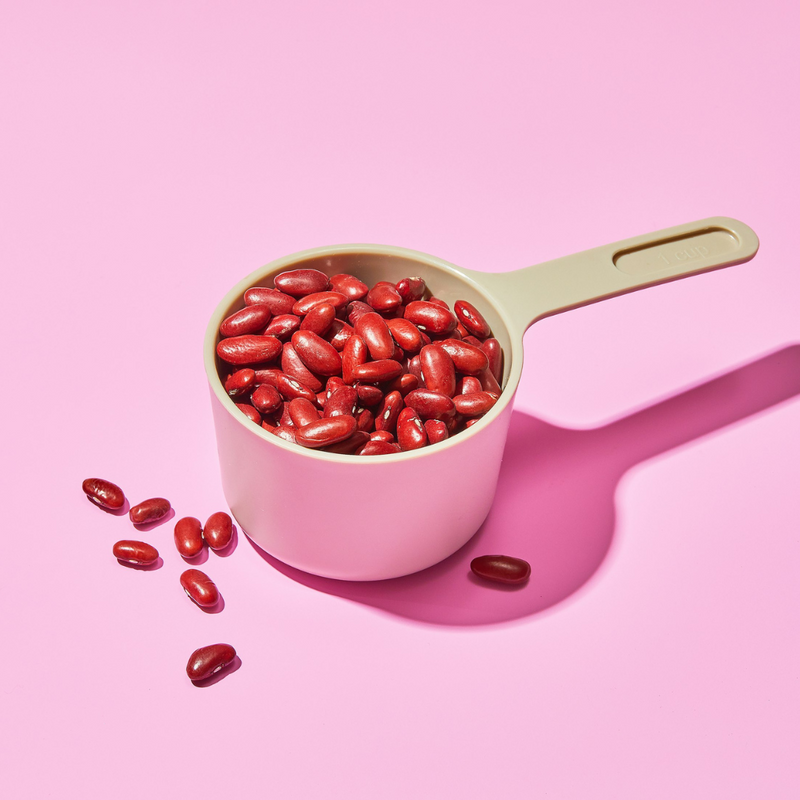Whether you're a weekend warrior or a serious athlete, your body needs prebiotic fiber and complex carbohydrates to fuel your workout (and your gut!). Learn more about carbs and fiber, why they're important, and what makes exercise and gut health the ultimate dream team for optimal performance.
What Are Carbohydrates?
Carbohydrates are sugar molecules that your body uses for fuel. And along with protein and fat, they are a major macronutrient required in your daily diet. For an average person on a 2,000-calorie per day diet, it's recommended you consume between 45-65% of those calories from nutrient-dense carbohydrate foods.1
Carbs for Athletes: How Many Carbs Do Athletes Need?
For active adults and competitive athletes, carbohydrate recommendations are even more personalized. The amount of carbs you need depends on your body weight, body type, duration of exercise training, intensity, or participation in a team sport.
For example, if you take part in team sports you may need between 500-800 grams of carbohydrates per day to help fuel and prepare for competition. For context, one slice of whole wheat bread provides about 15 grams of carbohydrates, so yes that’s a lot of carbs! Including high amounts of carbohydrates in the diet helps promote carbohydrate availability for working muscles. This helps ensure that your body has the energy it needs for optimal performance.2 In other words, carbs help get the job done!
Nondigestible Carbohydrates and Sports Performance
Carbs help provide energy for your brain, central nervous system, and working muscles. So it's no wonder that they've received considerable attention in the sports nutrition world.2 Especially non-digestible carbs like prebiotic fibers and resistant starches. These non-digestible carbs help support microbial diversity in the gut, keeping your gut healthy and happy.3
For example, a study in endurance-trained athletes found that athletes supplementing with a prebiotic-resistant starch for 28 days had an increase in good-for-you microbial species in their gut. Why is this important? Low gut diversity could compromise your gut (and overall) health.4
Exercise Performance and the Gut: What's the Connection?
There's also a connection between dietary intake, exercise performance, and the gut.5 6 7 The gut is a very active organ and regular exercise and training play a helpful role in the structure and diversity of your gut microbiota.5 For example, researchers found that athletes tend to have higher gut microbiota diversity compared to sedentary individuals. This means there are more helpful bacteria to keep you healthy. Which as we mentioned, is a very good thing!
And along with an abundance of healthy bacteria, athletes also tend to have higher levels of butyrate-producing bacteria.7 8 Excuse me, butyrate-producing what?! When the good bacteria in your gut break down the fiber in your colon, this produces a short-chain fatty acid called butyrate. Butyrate is the main source of energy for your colon cells. It helps support your immune system and could even support your muscle function and exercise performance.3 So if you're an athlete, adding prebiotics to your diet could play a helpful role in not just better gut health, but better performance on the field (or wherever your sport takes you!).
What are prebiotics?
Prebiotics are non-digestible carbohydrates that can pass through your digestive system completely undigested. That is until they hit the colon when they're fermented by naturally present bacteria to produce SCFAs, including acetate, propionate, and butyrate.
Foods that contain prebiotic fibers include:
- Oats
- Chickpeas
- Asparagus
- Leeks
- Chicory
- Garlic
- Artichoke
- Onions
And more. Plus don't forget about prebiotic soda beverages like OLIPOP!
Exercise, Fiber, and Gut Health
While prebiotic fiber is important and has many benefits for gut health, some athletes may follow a low-fiber plan prior to exercise, training or a major event or competition. This is because ingestion of too much fiber close to a workout may cause gastrointestinal disturbances.
If you're an endurance athlete, you're even more likely to experience GI disturbances.9 This is due to reduced blood flow to your gastrointestinal tract over time, resulting in the depletion of energy, stress, and oxygen levels. In response to this, the gastrointestinal tract releases signals that could result in discomfort. This is particularly the case if you're not giving your body adequate nutrition and rest following your workout.3
But don't fret, this isn't the case for all athletes! Many athletes can eat fiber without GI complaints during training and days leading up to a major competition or event. As research in this area continues it offers some promising insights. But in summary, think of your gut as an active organ that needs proper nourishment and care. Feed your gut nutrient-dense carbs and prebiotics and you might notice a difference in your athletic performance.3
How to Boost Exercise Performance and Train Your Gut With Carbs & Fiber
Here are some practical takeaways for athletes and weekend warriors to help optimize your performance and train your gut:
- Think about including nutrient-dense carbohydrates, including prebiotics, in your diet such as whole grains, a variety of fruits, veggies, and starches.
- Consider working with a registered dietitian (RD) to help design an eating plan that fuels optimal performance during the pre-exercise, exercise, and post-exercise recovery period.
- Troubled by GI disturbances on occasion? Change your diet during training and work with a dietitian to help customize a plan that minimizes disturbances and symptoms during competition day.
- Are you a low-fiber consumer to begin with? Consider introducing one fibrous food or beverage at a time to give your gut time to acclimate to these new foods or beverages.
- Understand that we each have a unique GI tract and finding a nutrition regimen that works best may take adaptation and time.
Got more gut questions? Join us on our blog for even more gut health tips and strategies. And don't forget to pick up an OLIPOP on the way!
Sources
- Institute of Medicine: Dietary Reference Intakes. Energy, Carbohydrate, Fiber, Fat, Fatty Acids, Cholesterol, Protein and Amino Acids. Washington, DC: National Academy Press; 2002.
- Thomas D.T., Erdman K.A., and Burke L.M. Position of the Academy of Nutrition and Dietetics, Dietitians of Canada, and the American College of Sports Medicine: Nutrition and Athletic Performance J Acad Nutr Diet 2016; 116(3): 501-528.
- Hughes R.L., Holscher H.D. Fueling Gut Microbes: A Review of the Interaction between Diet, Exercise and the Gut Microbiota in Athletes Adv Nutr 2021; 12: 2190-2215.
- West N.P. et al. Butyrylated starch increases colonic butyrate concentration but has limited effects for immunity in healthy physically active individuals. Exercise Immunol. Rev 2013; 19: 102-119.
- Jang L.G., Geunhoon C, Sung-Woo K, Byung-Yong K, Sunghee L, Park H. The combination of sport and sport-specific diet is associated with characteristics of gut microbiota: an observational study Journal of the International Society of Sports Nutrition 2019; 16:21.
- Rios J.L., Bomhof M.R., Reimer R.A., Hart D.A., Collins K.H., Herzog W.H. Protective effect of prebiotic and exercise intervention on knee health in a rat model of diet-induced obesity Nature 2019; 9:3893.
- Estaki M, et al. Cardiorespiratory fitness as a predictor of intestinal microbial diversity and distinct metagenomic functions Microbiome 2016; 4(1): 42.
- Barton W, et al. The microbiome of professional athletes differs from that of more sedentary subjects in composition and particularly at the functional metabolic level Gut 2018; 67 (4): 625-33.
- de Oliveira EP, Burini RD, Jeukendrup A. GI complaints during exercise: prevalence, etiology, and nutritional recommendations. Sports Med 2014; 44(81): 79-85.
- Consider including nutrient-dense carbohydrates in your diet such as whole grains, a variety of fruits, veggies, and starches.
- Talk to a registered dietitian (RD) to help design an eating plan that fuels optimal performance.
- Try introducing one fibrous food or beverage at a time to give your gut time to acclimate to new foods or beverages.





